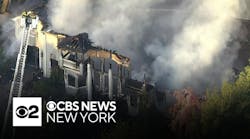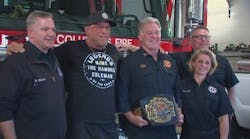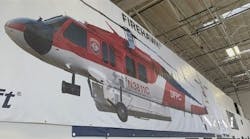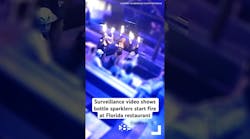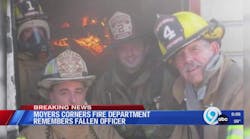This month's column will bring my writing about the concepts of self-assessment and personal planning full circle. In my previous two columns, I discussed the ways in which you need to lay the groundwork to let you have a working knowledge of the concepts of assessment and personal strategic planning. You need to examine not only yourself, but that part of the world wherein you will be living your personal and professional life. In those two columns, I provided reasons to do this, as well as the steps for you to consider using. You must assess your strengths and weaknesses in order to asses the impact of who you really are as a person and develop a realistic plan of what you may be able to accomplish during your time in the fire service.
To demonstrate that I am not a "do-as-I-say, not-as-I-do" sort of guy, I have updated the findings of my research to show you the personal development plan I created for use during my 60s. This plan will include what I want to accomplish in the next 10 years. Please read this plan closely. I want you to know and understand that I will be working to live the example that I am encouraging you to adopt. What follows is a personal strategic plan for my life.
To make the plan work for me, I had to reach out to a number of fine folks. Each has played a critical role in my life. Each has helped me to develop into a more effective professional within the fire service as well as within my community. More importantly, each has helped me to become a better person:
- Dr. Robert Fleming, a professor of management at Rowan University and nationally respected authority on fire officer personal and professional development, has been a colleague and mentor over the years and has played an instrumental role in my formulation of personal and professional goals and realistic implementation strategies. Dr. Fleming has provided sound and meaningful guidance with respect to personal integrity, courage, time management, effective communication skills, mentoring, coaching and integrity.
- Steve Austin is a respected, long-time fire service leader who formerly worked for the State Farm Insurance Co. He is a past president of the Delaware Volunteer Fireman's Association, a past president of the Cumberland Valley Volunteer Fireman's Association and a fire police officer with the Aetna Hose, Hook, and Ladder Company in Newark, DE.
- Billy Goldfeder is a deputy chief with the Loveland-Symmes Fire Department in Loveland, OH. A long-time author and lecturer on fire service operational, safety, and leadership topics, Billy is widely known for his direct style and forthright approach to the issue of firefighter safety. He is also on the board of directors of the National Fallen Firefighters Foundation.
- Reverend Scott Brown is the senior pastor at the Colts Neck Reformed Church in Colts Neck, NJ, among the most dynamic and fastest-growing congregations within the Reformed Church in America.
- Reverend Chris Van DeBunte is the associate pastor at the Colts Neck Reformed Church.
- Jack Peltier is a retired assistant chief with the Marlboro, MA, Fire Department and an authority on fire department operations, fire service training, arson investigation and apparatus specification. He will assist with issues involving integrity, courage, listening, coaching and mentoring skills.
- Roger Busico is a computer expert in the private sector. He is a long-time member of the volunteer fire service and a member of the Adelphia Fire Company in Howell Township, NJ, for a decade. He wrote a column for many years on the administrative side of volunteer fire department operations. He will assist me on the issue of loyalty in a volunteer department.
Goal 1
I will develop a personal integrity statement.
Goal 2
I will create an educational program that defines the concept of courage and explains its role within the fire service.
Goal 3
I will develop an educational program on the positive and negative aspects of organizational pride in the fire service.
Goal 4
I will improve my knowledge of the Reformed Church in America. I will engage in a personal interaction with Reverend Brown and Reverend Van DeBunte. This project will involve personal meetings, reading assignments and church-related activities, supplemented by church audio-visual materials.
Goal 5
I will study Austin's work habits, interpersonal skills, political capabilities and cultural-sensitivity attributes to improve my time-management and work habits. This will be an ongoing interactive process involving monthly telephone conversations and quarterly meetings.
Goal 6
I will create a research paper on time management and procrastination. This goal will include a study of the works by Steven Covey and Kenneth Blanchard.
Goal 7
Beginning immediately, I will work to improve my listening skills.
Goal 8
Beginning immediately and continuing on a monthly basis, a mentoring relationship will be instituted whereby I will be mentored by Peltier and Austin. Issues to be covered are listening skills, patience, persistence, tendency to be stubborn and the tendency to be abrupt. This goal will be monitored by monthly telephone conferences. Topics from the entire list of strengths and weaknesses may be open for debate during any given call.
Goal 9
I will enter into a practical study of the issues of leadership, loyalty and trust. There will be interactions with a variety of fire department co-workers and associates in other fire departments. The purpose of these conversations will be to monitor my personal leadership process and my weekly contributions to the fire service on Firehouse.com and the magazines for which I am a contributing editor.
Goal 10
I will begin a formal mentoring/coaching program for selected members of the fire service. I will limit the number of people to three so that my energy is not lacking in focus. I will meet people through:
- Major fire conventions
- My website
- Firehouse.com
- Firehouse® Magazine
- Referrals from friends and associates
The completion of these goal-directed activities and behaviors will let me move in the direction of my vision. It is my hope that I may become the recognized expert on matters of leadership and organizational development in the American fire service.
Developmental Activities
The goals listed above involve learning activities. A series of developmental activities must be undertaken as a necessary adjunct to the basic learning activities listed in the section on behavioral goals. Each aspect of my life has been laid out in the list of activities that follow. Each must be completed if I am to have any hope of fulfilling my mission and reaching toward my vision. Each plays a supporting role in the overall march toward leadership improvement and success.
Education
- I will complete my New Jersey State Instructor's recertification courses as mandated by state law.
- I will complete six educational seminars during each of the next three years.
- I will endeavor to read a minimum of one new leadership book per quarter in each quarter of the years 2009 and 2010.
Research
- The research findings for future exploration, from the final section of my dissertation, will be the jumping-off point for a series of major fire service articles. One article per two-month time frame will be written during the next three years.
- I will continue to perform research and write on the topic of leadership for my Command Post column in Firehouse®.
- I will write one major leadership research paper per year for a non-fire service, peer-reviewed journal.
- I will continue to review the literature of the leadership field on a monthly basis.
- My research effort will be supported by the creation of a personal journal wherein the results of the research can be cataloged for review and use.
Mentoring & Coaching
- I will establish a mentor/coaching relationship with one volunteer firefighter. The purpose of this relationship will be to impart my knowledge and guidance to the younger person, as well as to share my decades of varied fire service experience.
- I will continue to respond to the questions that come from readers of my magazine writing. I will counsel a minimum of three people.
- I will coach and mentor people via the Internet whenever possible. I will keep a journal of these activities for possible use as the basis for a text on coaching and mentoring.
Human Interaction
- I will maintain an active membership posture in at least three membership or musical organizations. These will all be active voluntary association commitments.
- I will work to become more involved in the life of the Colts Neck Reformed Church.
Consulting Work
One key to assuming the leadership role in the fire service that is outlined in the vision statement in an earlier column is the success of my consulting practice.
- To foster the leadership role of my firm, I will work to increase my presence at the national-level fire department conferences.
- I will assume and maintain a leadership position in one state-level and one national-level association.
- To bolster my effort to increase my consulting firm's position in the fire service, I will work to present a paper or deliver an educational program at three major conferences on an annual basis.
- I will work to improve my expert-level positioning by increasing my professional association workload to three active organizational assignments over the different organizations to which I belong. All achievements will be logged into my leadership review journal.
- I will undertake an expansion of my core leadership programs within my consulting practice. I will seek to improve my service delivery rate by a factor of 10% per year over the next five years. Records will be kept in my leadership achievement journal.
Knowledge Management
- I will begin to create a systematic research filing system in my office.
- I will work to create a secure library system for the vast array of fire service literature dating back to the 1920s.
- I will begin the creation of an ad hoc fire service research committee. The goal of this committee will be the creation of a body of management information to support the working fire service.
Writing & Lecturing
- The key to becoming the recognized national spokesperson for the American fire service will involve an increased effort in the arena of writing and lecturing. With this in mind, I will work to create a written plan for reaching every fire service publication on a regular and recurring basis. I will work to set up a speaking engagement schedule that will allow me to have completed at least two speaking engagements in each state by July 29, 2020. This schedule will be front-end loaded so that populous states in the areas east of the Mississippi are completed more quickly.
- I will pursue an academic appointment at an online college or university.
Conclusion
The work that led to these commentaries had its genesis in an assignment for a doctoral course in 2004, when I would like to believe that a change came over me. I felt that my leadership style was pretty much cast in concrete. After all, I have served in leadership positions for over three decades. That view was extremely short-sighted.
I have needed and used leadership skills in each aspect of my personal and professional life. The results of the testing tools provided by Capella University reinforced aspects of my personality and leadership style. However, there was also a certain amount of information that challenged my thinking of just who I am and how I need to operate.
I will now use these columns as a template to assess and improve my abilities and capabilities. It will require professional associates to assist me in my endeavors. Fortunately, each member of this advisory board of directors is a friend of long standing. The members of this group and I already interact on a frequent and mutually supportive basis. Whether my plan is completed exactly as written will not matter. What will matter is the conscious interaction between and among friends to strengthen and broaden my abilities to function within the fire service.
There may never be a way to determine whether there has been a conscious fulfillment of all the tenets of this plan, but that is not really important. What is important is undertaking a conscious program of personal development. It can be done. I urge you to try it.
DR. HARRY R. CARTER, Ph.D., CFO, MIFireE, is a Firehouse® contributing editor. A municipal fire protection consultant based in Adelphia, NJ, he is the former president of the International Society of Fire Service Instructors. Dr. Carter is a past chief and active life member of the Adelphia Fire Company. Currently chairman of the Board of Fire Commissioners for Howell Township District 2, he retired from the Newark, NJ, Fire Department in 1999 as a battalion commander. He also served as chief of training and commander of the Hazardous Materials Response Team. Dr. Carter is vice president of the American Branch of the Institution of Fire Engineers (MIFireE). He recently published Living My Dream: Dr. Harry Carter's 2006 FIRE Act Road Trip, which was also the subject of a Firehouse.com blog. He may be contacted at [email protected].
